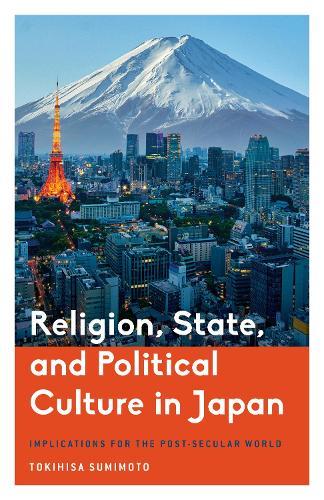Overview
Japan had developed a secular civilization long before going through its modern period, characterized by the officially-sanctioned unification of nationalism and state-worship that reached its apotheosis during World War II, followed by the economic growth-oriented post-war period. While the relationship between religion and state has varied significantly over time, what has been consistently observed throughout Japan’s history is the absence of religions that are socially influential but independent from the state, or the absence of a dualistic relationship between religion and state. The kind of political ethos that should underpin democratic principles such as the rule of law and human rights has remained underdeveloped. This book examines the concept of “reconstructive postmodernism,” a perspective that has emerged from a normative approach to international relations that emphasizes the need to democratize and humanize the secularistic civilizations based on the reconstruction of spirituality and religiosity. Using this concept, this book offers a number of implications of its findings to the case of Japan and for global governance in the post-secular age more broadly.
Full Product Details
Author: Tokihisa Sumimoto
Publisher: Rowman & Littlefield International
Imprint: Rowman & Littlefield International
Dimensions:
Width: 14.50cm
, Height: 1.90cm
, Length: 22.30cm
Weight: 0.354kg
ISBN: 9781786605948
ISBN 10: 1786605945
Pages: 182
Publication Date: 15 November 2023
Audience:
General/trade
,
General
Format: Hardback
Publisher's Status: Active
Availability: Manufactured on demand

We will order this item for you from a manufactured on demand supplier.
Reviews
A fascinating and illuminating inquiry into strengthening democracy in postwar Japan by the selective infusion of religious and spiritual revitalization in a political setting that Sumimoto creatively portrays as 'a post-secular world.' Although the focus is on overcoming statist absolutism arising from Japanese pre-1945 experience with religiously endowed emperor worship, the book is greatly enriched by comparative national studies and by valuable commentary on the relevance of religion to humane global governance. Reading this book is an intellectually exciting and challenging learning experience.--Richard Falk, Albert G. Milbank Professor of International Law Emeritus, Princeton University This is not only a potent study of historical and current relationships between religious belief and democratic culture in Japan, but also a powerful solvent for blithe assumptions about secularisation, there and in the wider world. In addition, it offers a considered response to how we might achieve more humane forms of global governance.--Jim Whitman, General Editor, Palgrave Global Issues series
This is not only a potent study of historical and current relationships between religious belief and democratic culture in Japan, but also a powerful solvent for blithe assumptions about secularisation, there and in the wider world. In addition, it offers a considered response to how we might achieve more humane forms of global governance. A fascinating and illuminating inquiry into strengthening democracy in postwar Japan by the selective infusion of religious and spiritual revitalization in a political setting that Sumimoto creatively portrays as 'a post-secular world.' Although the focus is on overcoming statist absolutism arising from Japanese pre-1945 experience with religiously endowed emperor worship, the book is greatly enriched by comparative national studies and by valuable commentary on the relevance of religion to humane global governance. Reading this book is an intellectually exciting and challenging learning experience.
A fascinating and illuminating inquiry into strengthening democracy in postwar Japan by the selective infusion of religious and spiritual revitalization in a political setting that Sumimoto creatively portrays as 'a post-secular world.' Although the focus is on overcoming statist absolutism arising from Japanese pre-1945 experience with religiously endowed emperor worship, the book is greatly enriched by comparative national studies and by valuable commentary on the relevance of religion to humane global governance. Reading this book is an intellectually exciting and challenging learning experience. --Richard A. Falk, Albert G. Milbank Professor of International Law Emeritus, Princeton University This is not only a potent study of historical and current relationships between religious belief and democratic culture in Japan, but also a powerful solvent for blithe assumptions about secularisation, there and in the wider world. In addition, it offers a considered response to how we might achieve more humane forms of global governance. --Jim Whitman, General Editor, Palgrave Global Issues series
Author Information
Tokihisa Sumimoto is the Founding Director of the Tokyo Institute for Global Peace and Humanity. He received his Master of International Affairs degree from Columbia University, New York, and Doctor of Philosophy from Soka University, Tokyo. He has published articles in the International Journal of Peace Studies.




